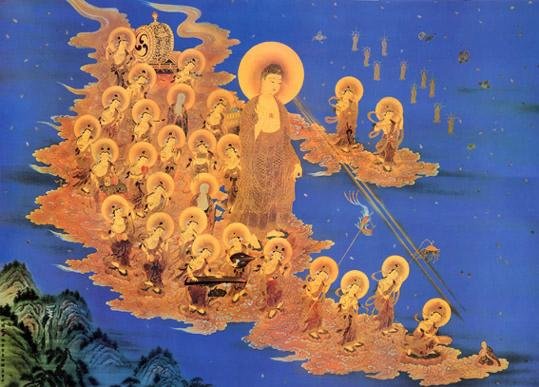Rebirth of Bhikkhu Buddhabhadra (Liu Song Dynasty)
Buddhabhadra. He was called Juexian in Chinese. He was from Kapilavastu, India, and a descendant of King Amritavartin (Buddha’s uncle). He became a novice monk when he was young. At the age of sixteen, he had already learned a wide range of scriptures and had a deep understanding of Chan (Zen) and Vinaya. After going to the Western Regions, Zhiyan, a monk of Yao Qin, invited Buddhabhadra to return to the East with him, so they arrived in Qingzhou by sea and then went to Chang'an. The prince of Yao Qin invited him to the East Palace to preach the Dharma and discuss the relationship between form and emptiness with Master Kumarajiva, which were both deeply in line with the profound and subtle principles of Buddhism. Later, he went to Mount Lu and joined Master Huiyuan’s Lotus Society. He translated the "Visualisation of the Buddha Samadhi Sutra", "Parinirvana Sutra", and "Treatise on the Convenient Way of Practice", et cetera, a total of fifteen volumes, and later chanted Amitabha Buddha's name and attained rebirth in the sixth year of Yuanjia (429 AD) of Emperor Wen of Liu Song. (Donglin Biography)
刘宋 佛驮跋陀罗
佛驮跋陀罗。华语称为觉贤。印度迦维罗卫国人,甘露饭王的后代,从小就出家为沙弥。年十六岁时,已经广博学习了种种经典,深入通达禅法戒律。姚秦沙门智严,往西域之后,邀请佛驮跋陀罗和他一起回东土去,于是经海路到达青州,然后到长安。姚秦太子迎请他到东宫演说佛法,并与罗什大师讨论色空的关系,都能深深契合佛法幽玄奥妙的义理。后来又到庐山,加入远公的莲社,翻译出《观佛三昧经》、《般泥洹经》,以及《修行方便论》等,共计十五部,后来在刘宋文帝元嘉六年 ( 西元四二九年 ) 念佛往生。( 东林传 )

